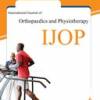Volume 1, Issue 1, 2015

Mcmed International
International Journal of Orthopaedics and Physiotherapy
Issn
XXX-XXXX (Print),
XXXX-XXXX (Online)
Frequency
bi-annual
Email
editorijop@mcmed.us












